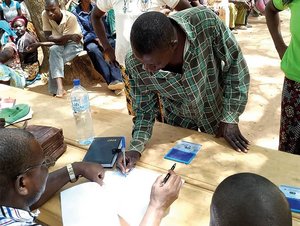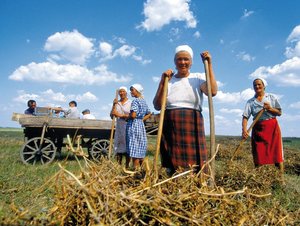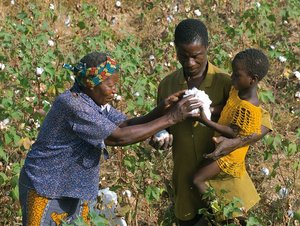Rural development

Good rural governance is key to realising rights, leaving no-one behind and achieving sustainability of rural development programmes. Yet, it does not receive the attention it requires. In a world that is likely to miss the Sustainable Development Goals in eleven years from now, a discussion on rural governance is an urgent necessity.
- Hot, colourful and remunerative(2024)
- Strengthening rural resilience in India(2024)
- Khushal Sar lake – A success story for ecosystem restoration(2023)
- Activating rural voices for effective implementation of tobacco control policies(2023)
- Engaging the community in solving the bushmeat crisis(2021)
- Displaced and forgotten(2020)
- Our Village – creating endogenous growth(2019)
- The true price of gold(2019)
- Rural governance – a precondition for inclusive and sustainable rural transformation(2019)
- Breaking the mode of demolition and reconstruction(2018)
- A small effort and a big impact – From pedestrian to tractorable bridges(2018)
- Beekeeping in Ethiopia’s wheatbelt – a way towards sustainable agro-ecosystems(2017)
- Organic and Fairtrade cotton – a way out of rural poverty?(2017)
- The Beira Development Corridor – an upswing or a sell-out?(2016)
- An East African comeback(2016)
- Boosting commercial sorghum production and marketing with the "aggregator model"(2014)
- Microfinance lending for farming in Congo – a worthwhile risk?(2013)
- Marketing local rice to African consumers(2013)
- Mapping hotspots of marginality for area identification(2013)
- Empowering rural traditional sex-workers in Rajasthan(2012)
- The real price of rare earths(2012)
- From technocratic to participatory planning? Water supply and sanitation services development in post-Soviet Moldova(2012)
- Mutual support groups surge ahead(2012)
- Mali tourism under terrorist threat(2012)
Cooperatives

The cooperative model has been sidelined in development cooperation for many years – for various reasons. On the one hand, cooperatives have been completely overestimated as an instrument and expected to solve a whole bunch of problems at one stroke. On the other hand, they were long misused for state purposes and have therefore been regarded with mistrust. The fact that the United Nations has declared 2012 the International Year of Cooperatives is a good opportunity to take a closer look at this special form of enterprise. We wish to give you an idea of the range of manifestations that the cooperative model has taken worldwide and of the role that cooperatives can play in overcoming rural poverty.
- Farmer co-operatives in China – not exploited to the full(2017)
- Cooperatives - the magic bullet of poverty reduction?(2012)
- The political dimension(2012)
- A path of trial and tribulation(2012)
- A significant factor, but not a panacea(2012)
- Nicaragua: Cooperatives at the crossroads(2012)
- Between organic development and state control(2012)
- Community banks: A chance for agri-based African rural communities(2012)
- Beyond economic empowerment(2012)
- The Raiffeisen idea – a model for sustainable development?(2012)
Family farming

2014 is the International Year of Family Farming. What makes family farms so important is that they are the main producers of food consumed locally in both developed and developing countries. There are around 525 million family farmers, and they account for well over half of all agricultural production. Thus they play a crucial role in maintaining global food security. To raise awareness of this significance, but also to show governments and society what they have to do to support family farms in performing this important role is the notion behind the United Nations’ proclaiming the International Year of Family Farming.
- Strengthening family farms: a path to follow in combatting poverty in Africa(2016)
- Unleashing the potential of family farming(2014)
- “Family farms are key to feeding the world”(2014)
- More than just a business(2014)
- What is so special about family farms?(2014)
- Strenghthening family farms in Mercosur(2014)
- Women – the untapped potential for food security(2014)
- "We have inherited not only a piece of land, but also the responsibility to turn it into a home"(2014)
- Machinery rings – a mechanisation concept for African farmers?(2014)
- Agricultural biodiversity: the foundation of resilient family farms(2014)
- Tangible sustainability(2014)
- Family farming – a model with a future?(2014)
Mechanisation

It’s easy to find arguments in favour of raising the degree of farm mechanisation. It’s just as easy to find examples of ambitious mechanisation concepts that failed miserably. Our authors show why and how the individual regions throughout the world have developed differently in terms of mechanisation and present examples of concepts that are really forward-looking, i.e. sustainable with a view to climate change and scarce natural resources, and that are above all also suitable for smallholders.
- Machinery rings – an innovative approach to mechanising Kenyan agriculture(2022)
- Rural mechanisation – where are we now, and where should we be going?(2015)
- A round tour of mechanisation(2015)
- Animal traction – potential and constraints(2015)
- Mechanisation – a catalyst for rural development in sub-Saharan Africa(2015)
- “Farmers have to get organised”(2015)
- Sustainable mechanisation – a hard row to hoe(2015)
- Solar pumps and drip irrigation help Indian farmers save water and energy(2015)
- Sorting out the cocoa maze with pole pruners(2015)
- Biodegradable mulch – a solution for small-scale horticulture? (2015)
- A food processing machine that makes a difference(2015)



